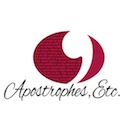
Adjectives have a simple use: they describe nouns, and also pronouns and other adjectives. A simple definition is that adjectives are ‘describing words’.
If we think of nouns as containers of meaning, adjectives help to give extra definition to our meaning. We can talk about a container, for example, or a yellow container or a red container. Red and yellow are adjectives, providing more information about the particular container we are talking about.
Recognising adjectives
Adjectives can be tricky to recognise, because words that are used as other parts of speech are also used as adjectives. This is one of the key things about how the English language works: you cannot work out what part of speech a word is by looking at the word on its own. You have to look at what function the word is playing in a group of words, such as sentence, phrase or clause.
Words that we use as nouns, verbs and adverbs are also used as adjectives (I’ll explain more about adverbs in a few weeks). Consider the word rose in these three sentences:
- The rose had not yet fully opened.
- The sun rose over the horizon.
- The rose dress was her favourite.

In the first sentence, rose is a noun: it follows the word the, and we can also make it plural (The roses). In the second sentence, rose is a verb: the simple past tense form of to rise. Rose is the action the sun has performed. In the final sentence, rose is an adjective: it describes what type of dress she likes best.
Complicated? Yes, it is a bit, at first. But working out what function a word has in a sentence – what part of speech it is – does get easier the more you do it.
Generally, the clue to recognising whether a word is an adjective is its position. Adjectives most often come before the noun, pronoun or adjective they describe. Adjectives that come before the word they describe are called attributive adjectives. Sometimes, adjectives are found alone at the end of the sentence (or other group of words they are part of); these adjectives are called predicative adjectives.
- The purple flower caught my attention. (purple: attributive adjective)
- The flower is purple. (purple: predicative adjective)
Predicative adjectives are found only after some verbs:
- the verb to be
- verbs that reflect things as they are now: appear, feel, look, remain, seem, smell, sound, taste
- verbs that reflect how things are changing or will be in the future: become, come, fall, get, go, grow, prove, run, turn
These verbs, in turn, have their own special name (or names, because, look so many terms in grammar, there isn’t one term that everyone agrees on). They are called linking or copulative verbs (and I’ll discuss them next year when I look at sentence structures).
Verbs as adjectives
I wrote in an earlier post about how some verbs can be used as nouns, and that when the present participle form is used as a noun it is called a gerund.
Present participles can also be used as adjectives; some people call present participles used this way gerundives, based on a similar usage in Latin. Other authorities, including my favourite go-to reference, The Cambridge Guide to English Usage, say that gerundives don’t exist in English. Make up your own mind! I like the word gerundive, and I don’t know Latin, so I’m happy to use the word for present participles used as adjectives in English.
- The smiling assistant cheered me up. (smiling: gerundive or present participle used as an adjective)
- The Laughing Cavalier is a famous painting. (Laughing: gerundive or present participle used as an adjective).
Just to make things more complex, the past tense form of a verb is also sometimes used an adjective.
- Mimi’s hand seemed frozen. (frozen: predicative adjective)
- The excited puppy ran all around the garden. (excited: attributive adjective).


If you have found this post interesting, you can find a full index to my other posts on the index page. To be notified when I post a new topic, follow me on Facebook! If you have any particular questions you’d like me to answer in future posts, just send me a message. I’m always interested to learn what people think, and how you came across this site, so please post a comment.
If you think you would be interested in either my complete grammar course or an individual customised online course (particularly suited for people who don’t live in Melbourne), just click your preferred option.